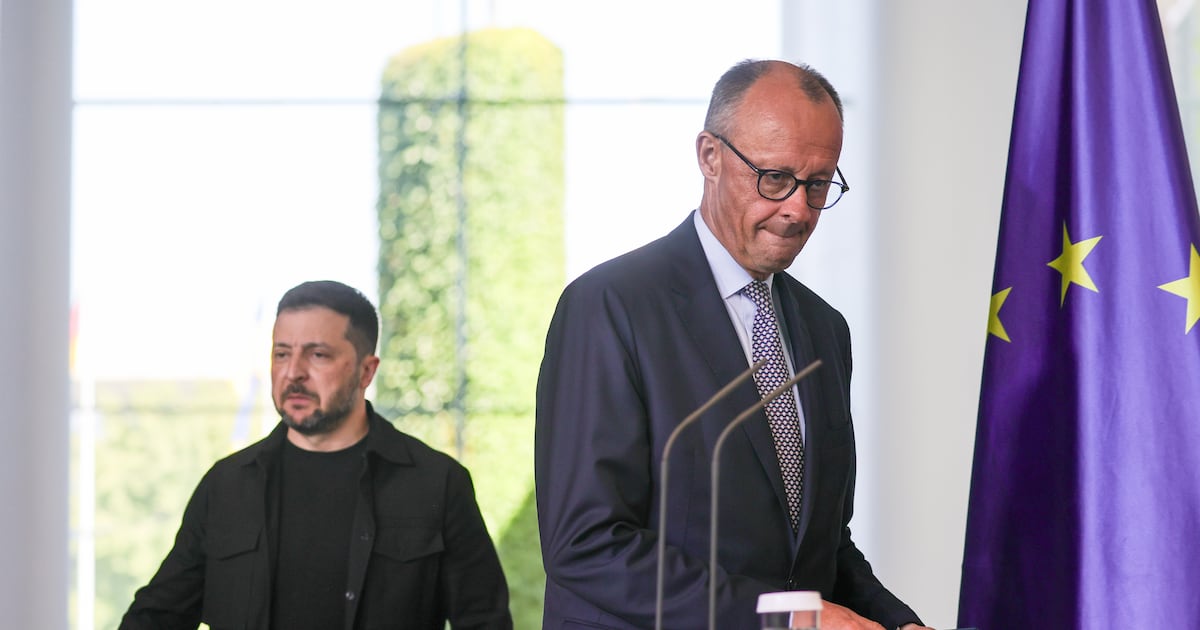US president Donald Trump has admitted Russian leader Vladimir Putin is unlikely to heed his appeal to stop targeting civilians and end the war in Ukraine at their meeting in Alaska on Friday.
After a video conference with European leaders on Wednesday, which Mr Trump said he would ratet ”a 10”, he renewed his threat of “severe consequences” unless Mr Putin agreed a ceasefire and an end to civilian deaths.
“I’ve had that conversation with him … then I go home and I see that rocket hit a nursing home or an apartment building and people are laying dead in the street,” he said.
In talks in Berlin on Wednesday, Ukrainian president Volodymyr Zelenskiy said the US leader had agreed to a key Ukraine demand for postwar security guarantees and a ceasefire as part of a deal to end the three-and-a-half year conflict.
“We want a ceasefire, we want strong security guarantees and president Trump confirmed this and said he supports this,” said Mr Zelenskiy, who is not invited to Friday’s talks. “What we need is to exert pressure to achieve peace.”
[ Why Putin has good reasons to be hopeful for Friday’s summit meeting with TrumpOpens in new window ]
Regarding Mr Trump’s recent talk of “land swaps” between Russia and Ukraine, Mr Zelenskiy declined to rule out the idea.
Instead, hesitating for a moment during a press conference, he added that “our territorial integrity is something that will be decided by the Ukrainians”.
A week after a previous deadline for Russia to move on its war in Ukraine, Mr Trump said he hoped for a “quick second meeting” including the Ukrainian leader, “that will be more productive than the first” on Friday in Alaska.
German chancellor Friedrich Merz, who initiated Wednesday’s online gathering with Mr Trump, appeared satisfied that Europe had laid down its red lines in an “extremely constructive” way that demonstrated “great unity” with Washington on key issues.
Mr Merz said he told Mr Trump the US could count on European leaders’ “full support” for any deal that maintains European and Ukraine’s security interests and respects national borders.
“We made clear that Ukraine must be at the table as soon as follow-up meetings take place,” said Mr Merz, at a joint press conference with his Ukrainian visitor. “I am hoping that Mr Trump will try to be assertive here.”
After the call with Washington – book-ended by a meeting with European leaders from Finland, France, the UK, Italy and Poland – European participants reported a more conciliatory line from the US president than in the past.
Mr Trump told European leaders he did not plan to get into a negotiation with Mr Putin about possible Ukrainian territorial concessions.
At several points during the call, European participants said the US president stated that future decisions around territory were for Mr Zelenskiy to make, according to one EU source briefed on the discussion afterwards.
French president Emmanuel Macron confirmed that, while there were “currently no serious territorial exchange schemes on the table”, Mr Trump agreed that “territories belonging to Ukraine cannot be negotiated and will only be negotiated by the Ukrainian president”.
Such guarantees from Washington – should they hold – will go some way to assuaging Ukraine’s fears, based on previous remarks by Mr Trump that a carve-up of its territory could be part of a peace deal agreed between Washington and Moscow.
The Ukrainian leader played down talk of a “historic” encounter, echoing Mr Trump’s insistence that Alaska will be a “feel-out” meeting with the Russian leader.
Mr Zelenskiy said he urged Mr Trump not to believe Mr Putin’s “bluffs” that Russia could occupy all of Ukraine, or that sanctions were ineffective.
He said the US president promised to call him after the meeting “to discuss results if there will be results, so we can discuss the next steps”.
Taoiseach Micheál Martin said the upcoming summit between Mr Trump and Mr Putin was “a critical time for Ukraine and Europe”.
Until now, Ukraine’s western allies have been cautious about committing to postwar security guarantees that might include troop deployments. Even on Wednesday, Mr Merz declined to be drawn on European commitments to security guarantees, saying the issue was not raised during talks and that allies would “discuss that when we find ourselves on a path to peace”.

